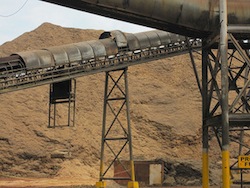What might be a good use of food waste? Hydrogen. Researchers from the University of Birmingham in the UK are creating bioenergy in the form of hydrogen for use an an alternative to gasoline. Researchers note that in a country like Brazil that is converting sugarcane to ethanol it may not be sustainable in the long-term. The reason is because the process generates carbon dioxide and agricultural waste. The advantage of creating hydrogen is that it can use the waste generated by the production of other products and it is sustainable and emission free.
 Professor Lynne Macaskie, Professor of Applied Microbiology at the University of Birmingham, gave a presentation on the hydrogen research during a collaborative workshop in São Paulo on May 14, 2012. “Fuel cells need clean energy to run them. If you provide bacteria with a supply of sugary waste from, for example, chocolate production, the bacteria can produce hydrogen. At the moment manufacturers pay to dispose of waste but with our technique they could convert it to clean electricity instead.”
Professor Lynne Macaskie, Professor of Applied Microbiology at the University of Birmingham, gave a presentation on the hydrogen research during a collaborative workshop in São Paulo on May 14, 2012. “Fuel cells need clean energy to run them. If you provide bacteria with a supply of sugary waste from, for example, chocolate production, the bacteria can produce hydrogen. At the moment manufacturers pay to dispose of waste but with our technique they could convert it to clean electricity instead.”
According to Macaskie, the research shows a huge potential for biohydrogen as a fuel for the future. “Biohydrogen could even be made from the wastes from bioethanol production – two biofuels for the price of one,” he said. “More work from focused teams, however, is needed, as agricultural wastes are tougher for bacteria to digest.”
The event was organized by O Conselho de Reitores das Universidades Estaduais de São Paulo (CRUESP) and the FAPESP bioenergy programme (FAPESP-BIOEN). Participants came from the University of Birmingham, the University of Nottingham, the State University of Campinas (UNICAMP), the University of São Paulo, and São Paulo State University (UNESP).

